Drills are an important tool to add to your toolkit whether you’re a professional or a DIY enthusiast. Deciding to get a drill is an easy task, getting one – isn’t so easy! That’s because there are different types of drills: impact drill, rotary hammer drills, hammer drills, air angle drills, and more available today.
To help you narrow down your options for a top-quality drill; even so, to the very one product that suits your budget, project, and skill, we have reviewed numerous drills from various manufacturers. We didn’t just assume that you’ve got a vast knowledge about drills so we also included some helpful articles to make this ride not puzzling, but conventional and very exciting.
Guides And Reviews
Hyundai HY2175 18v Cordless Combi Drill Driver Review
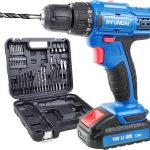 The Hyundai HY2175 drill is a versatile and powerful cordless power tool designed for drilling tasks on various materials such as wood, plastic tile, metal and more. With its key features and benefits, it's an excellent addition to any toolbox for… Read more.
The Hyundai HY2175 drill is a versatile and powerful cordless power tool designed for drilling tasks on various materials such as wood, plastic tile, metal and more. With its key features and benefits, it's an excellent addition to any toolbox for… Read more.
 The Hyundai HY2175 drill is a versatile and powerful cordless power tool designed for drilling tasks on various materials such as wood, plastic tile, metal and more. With its key features and benefits, it's an excellent addition to any toolbox for… Read more.
The Hyundai HY2175 drill is a versatile and powerful cordless power tool designed for drilling tasks on various materials such as wood, plastic tile, metal and more. With its key features and benefits, it's an excellent addition to any toolbox for… Read more.
Naerok NK20CD 18V to 20V Cordless Drill Driver Review
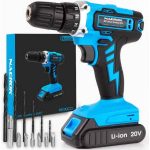 If you're in need of a powerful and versatile cordless drill, the Naerok NK20CD drill may be worth considering. This drill comes packed with features, including a 20V Lithium-Ion battery, a variable speed pressure trigger, forward and reverse… Read more.
If you're in need of a powerful and versatile cordless drill, the Naerok NK20CD drill may be worth considering. This drill comes packed with features, including a 20V Lithium-Ion battery, a variable speed pressure trigger, forward and reverse… Read more.
 If you're in need of a powerful and versatile cordless drill, the Naerok NK20CD drill may be worth considering. This drill comes packed with features, including a 20V Lithium-Ion battery, a variable speed pressure trigger, forward and reverse… Read more.
If you're in need of a powerful and versatile cordless drill, the Naerok NK20CD drill may be worth considering. This drill comes packed with features, including a 20V Lithium-Ion battery, a variable speed pressure trigger, forward and reverse… Read more.
MYLEK MYW09 18V Cordless Drill Review
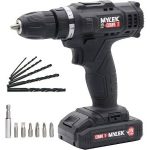 The MYLEK MYW09 drill is an excellent choice for those looking for a powerful and versatile drill that can handle a variety of materials. This cordless drill is designed with comfort and flexibility in mind, making it an ideal choice for both… Read more.
The MYLEK MYW09 drill is an excellent choice for those looking for a powerful and versatile drill that can handle a variety of materials. This cordless drill is designed with comfort and flexibility in mind, making it an ideal choice for both… Read more.
 The MYLEK MYW09 drill is an excellent choice for those looking for a powerful and versatile drill that can handle a variety of materials. This cordless drill is designed with comfort and flexibility in mind, making it an ideal choice for both… Read more.
The MYLEK MYW09 drill is an excellent choice for those looking for a powerful and versatile drill that can handle a variety of materials. This cordless drill is designed with comfort and flexibility in mind, making it an ideal choice for both… Read more.
Best 18V Cordless Drill UK Reviews
 With so many big names in the UK market selling cordless drills, it can be difficult to choose the best one for you. Names like Makita, Ryobi and Dewalt are the first that comes to mind when someone is looking for an 18V cordless drill.
Below… Read more.
With so many big names in the UK market selling cordless drills, it can be difficult to choose the best one for you. Names like Makita, Ryobi and Dewalt are the first that comes to mind when someone is looking for an 18V cordless drill.
Below… Read more.
 With so many big names in the UK market selling cordless drills, it can be difficult to choose the best one for you. Names like Makita, Ryobi and Dewalt are the first that comes to mind when someone is looking for an 18V cordless drill.
Below… Read more.
With so many big names in the UK market selling cordless drills, it can be difficult to choose the best one for you. Names like Makita, Ryobi and Dewalt are the first that comes to mind when someone is looking for an 18V cordless drill.
Below… Read more.
Best Makita Cordless Drill Reviews (UK Models)
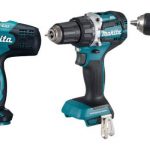 Finding the best Makita cordless drill is easier said than done because there are so many of them on the UK market at different prices. The first thing you need to do is have a clear picture of the tasks you're about to perform before you begin… Read more.
Finding the best Makita cordless drill is easier said than done because there are so many of them on the UK market at different prices. The first thing you need to do is have a clear picture of the tasks you're about to perform before you begin… Read more.
 Finding the best Makita cordless drill is easier said than done because there are so many of them on the UK market at different prices. The first thing you need to do is have a clear picture of the tasks you're about to perform before you begin… Read more.
Finding the best Makita cordless drill is easier said than done because there are so many of them on the UK market at different prices. The first thing you need to do is have a clear picture of the tasks you're about to perform before you begin… Read more.
Best Bosch Cordless Drill Reviews (UK Models)
 Whether you're a professional tradesman or someone who loves DIY, the one tool you can trust to repair kitchen cabinets or loose door knobs is a Bosch cordless drill. There are so many models of this tool on the market and they are loved by so many … Read more.
Whether you're a professional tradesman or someone who loves DIY, the one tool you can trust to repair kitchen cabinets or loose door knobs is a Bosch cordless drill. There are so many models of this tool on the market and they are loved by so many … Read more.
 Whether you're a professional tradesman or someone who loves DIY, the one tool you can trust to repair kitchen cabinets or loose door knobs is a Bosch cordless drill. There are so many models of this tool on the market and they are loved by so many … Read more.
Whether you're a professional tradesman or someone who loves DIY, the one tool you can trust to repair kitchen cabinets or loose door knobs is a Bosch cordless drill. There are so many models of this tool on the market and they are loved by so many … Read more.
Best Cordless Combi Drill UK Reviews (Battery-Powered)
 If you will be driving screws in concrete or any masonry work and you need a reliable tool, we’d advise you to go for a good cordless combi drill. Also known as an impact drill or hammer driver, a combi drill will help you drive screws in multiple… Read more.
If you will be driving screws in concrete or any masonry work and you need a reliable tool, we’d advise you to go for a good cordless combi drill. Also known as an impact drill or hammer driver, a combi drill will help you drive screws in multiple… Read more.
 If you will be driving screws in concrete or any masonry work and you need a reliable tool, we’d advise you to go for a good cordless combi drill. Also known as an impact drill or hammer driver, a combi drill will help you drive screws in multiple… Read more.
If you will be driving screws in concrete or any masonry work and you need a reliable tool, we’d advise you to go for a good cordless combi drill. Also known as an impact drill or hammer driver, a combi drill will help you drive screws in multiple… Read more.
Best Corded Hammer Drill Reviews (For Sale In UK)
 Hammer drills work similarly to a normal drill but provide a hammering action when driving the bits. They are also quite similar to impact drivers but offers more versatility. These drills come in both corded and cordless designs but our focus in… Read more.
Hammer drills work similarly to a normal drill but provide a hammering action when driving the bits. They are also quite similar to impact drivers but offers more versatility. These drills come in both corded and cordless designs but our focus in… Read more.
 Hammer drills work similarly to a normal drill but provide a hammering action when driving the bits. They are also quite similar to impact drivers but offers more versatility. These drills come in both corded and cordless designs but our focus in… Read more.
Hammer drills work similarly to a normal drill but provide a hammering action when driving the bits. They are also quite similar to impact drivers but offers more versatility. These drills come in both corded and cordless designs but our focus in… Read more.
BLUE RIDGE BR2808K2 18V Cordless Hammer Combi Drill Review
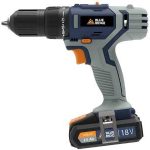 If you have some drilling and fastening projects in different areas around the house, a cordless drill combo is a right tool that you will need to handle those projects. Blue Ridge is one of the top power tool manufacturers, and they are known to… Read more.
If you have some drilling and fastening projects in different areas around the house, a cordless drill combo is a right tool that you will need to handle those projects. Blue Ridge is one of the top power tool manufacturers, and they are known to… Read more.
 If you have some drilling and fastening projects in different areas around the house, a cordless drill combo is a right tool that you will need to handle those projects. Blue Ridge is one of the top power tool manufacturers, and they are known to… Read more.
If you have some drilling and fastening projects in different areas around the house, a cordless drill combo is a right tool that you will need to handle those projects. Blue Ridge is one of the top power tool manufacturers, and they are known to… Read more.
Makita DHP484Z 18V Li-ion 54Nm Brushless Combi Drill Review
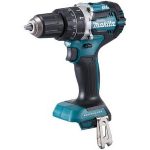 Combi-drills, also called hammer drills are taking the powertool industry by the storm. Its all-purpose design (drilling, driving, and drilling with hammering action) makes it a more cost-effective and space-saving option rather than buying and… Read more.
Combi-drills, also called hammer drills are taking the powertool industry by the storm. Its all-purpose design (drilling, driving, and drilling with hammering action) makes it a more cost-effective and space-saving option rather than buying and… Read more.
 Combi-drills, also called hammer drills are taking the powertool industry by the storm. Its all-purpose design (drilling, driving, and drilling with hammering action) makes it a more cost-effective and space-saving option rather than buying and… Read more.
Combi-drills, also called hammer drills are taking the powertool industry by the storm. Its all-purpose design (drilling, driving, and drilling with hammering action) makes it a more cost-effective and space-saving option rather than buying and… Read more.
Makita DHP482Z 18V 62Nm Combi Drill Review
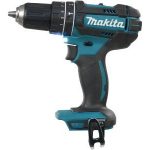 While a cordless combo drill might not have high power and maximum torque compared to a corded unit. But if you need one for the general DIY projects, then you are good to go with a cordless drill driver. Also, the portability of these babies makes … Read more.
While a cordless combo drill might not have high power and maximum torque compared to a corded unit. But if you need one for the general DIY projects, then you are good to go with a cordless drill driver. Also, the portability of these babies makes … Read more.
 While a cordless combo drill might not have high power and maximum torque compared to a corded unit. But if you need one for the general DIY projects, then you are good to go with a cordless drill driver. Also, the portability of these babies makes … Read more.
While a cordless combo drill might not have high power and maximum torque compared to a corded unit. But if you need one for the general DIY projects, then you are good to go with a cordless drill driver. Also, the portability of these babies makes … Read more.
Makita DHR202Z 18V Cordless Rotary Hammer Drill Review
 What's the price?
If you are on the market looking for a drill, you should prioritize quality, versatility, durability, and efficiency. These are very important things a tool you wish to buy whether for home or professional use must-have. One… Read more.
What's the price?
If you are on the market looking for a drill, you should prioritize quality, versatility, durability, and efficiency. These are very important things a tool you wish to buy whether for home or professional use must-have. One… Read more.
 What's the price?
If you are on the market looking for a drill, you should prioritize quality, versatility, durability, and efficiency. These are very important things a tool you wish to buy whether for home or professional use must-have. One… Read more.
What's the price?
If you are on the market looking for a drill, you should prioritize quality, versatility, durability, and efficiency. These are very important things a tool you wish to buy whether for home or professional use must-have. One… Read more.
Ryobi R18PD3-0 ONE+ 18V Cordless Compact Percussion Drill Review
 If you are looking for a drill that can handle tiles, masonry, wood, ceramic, plasterboard, metal, and plastic, look no further than the Ryobi R18PD3-0 ONE+. Not only can you use this to drill large holes in thick concrete, but you can also use it… Read more.
If you are looking for a drill that can handle tiles, masonry, wood, ceramic, plasterboard, metal, and plastic, look no further than the Ryobi R18PD3-0 ONE+. Not only can you use this to drill large holes in thick concrete, but you can also use it… Read more.
 If you are looking for a drill that can handle tiles, masonry, wood, ceramic, plasterboard, metal, and plastic, look no further than the Ryobi R18PD3-0 ONE+. Not only can you use this to drill large holes in thick concrete, but you can also use it… Read more.
If you are looking for a drill that can handle tiles, masonry, wood, ceramic, plasterboard, metal, and plastic, look no further than the Ryobi R18PD3-0 ONE+. Not only can you use this to drill large holes in thick concrete, but you can also use it… Read more.
HYCHIKA DD-18BC 18V Electric Drill Review
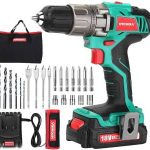 It is common to think that products from unpopular brands aren’t as excellent in performance, build-quality, and more as those from popular manufacturers. After all, if those products were that good, they would be known right? Well, sounds logical… Read more.
It is common to think that products from unpopular brands aren’t as excellent in performance, build-quality, and more as those from popular manufacturers. After all, if those products were that good, they would be known right? Well, sounds logical… Read more.
 It is common to think that products from unpopular brands aren’t as excellent in performance, build-quality, and more as those from popular manufacturers. After all, if those products were that good, they would be known right? Well, sounds logical… Read more.
It is common to think that products from unpopular brands aren’t as excellent in performance, build-quality, and more as those from popular manufacturers. After all, if those products were that good, they would be known right? Well, sounds logical… Read more.
BOSCH GSB 1600 RE Professional Impact Drill Review
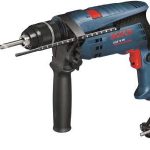 If you are a professional craftsperson or are looking for a perfect tool for heavy-duty drilling, impact drilling, and screw driving operations, a cordless drill driver wouldn’t be right for you. You should be considering a corded, pneumatic driver … Read more.
If you are a professional craftsperson or are looking for a perfect tool for heavy-duty drilling, impact drilling, and screw driving operations, a cordless drill driver wouldn’t be right for you. You should be considering a corded, pneumatic driver … Read more.
 If you are a professional craftsperson or are looking for a perfect tool for heavy-duty drilling, impact drilling, and screw driving operations, a cordless drill driver wouldn’t be right for you. You should be considering a corded, pneumatic driver … Read more.
If you are a professional craftsperson or are looking for a perfect tool for heavy-duty drilling, impact drilling, and screw driving operations, a cordless drill driver wouldn’t be right for you. You should be considering a corded, pneumatic driver … Read more.
Dewalt DCD796N 18v XR Li-Ion Brushless Compact Combi Hammer Review
 The Dewalt DCD796N is one of those unique tools on the market that allows you to hammer and drill at the same time. Made from durable materials, this tool is perfect for home DIY projects because of its impressive run time and ability to perform… Read more.
The Dewalt DCD796N is one of those unique tools on the market that allows you to hammer and drill at the same time. Made from durable materials, this tool is perfect for home DIY projects because of its impressive run time and ability to perform… Read more.
 The Dewalt DCD796N is one of those unique tools on the market that allows you to hammer and drill at the same time. Made from durable materials, this tool is perfect for home DIY projects because of its impressive run time and ability to perform… Read more.
The Dewalt DCD796N is one of those unique tools on the market that allows you to hammer and drill at the same time. Made from durable materials, this tool is perfect for home DIY projects because of its impressive run time and ability to perform… Read more.
TACKLIFE PID03B 850W Hammer Drill Review
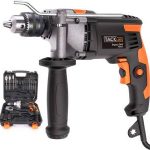 If you are looking for a power tool that is tailor-made for drilling projects and offers a high level of consistency as well as performance, the Tacklife PID03B is that tool. Its neat design with a mental death rod allows you to be accurate and at… Read more.
If you are looking for a power tool that is tailor-made for drilling projects and offers a high level of consistency as well as performance, the Tacklife PID03B is that tool. Its neat design with a mental death rod allows you to be accurate and at… Read more.
 If you are looking for a power tool that is tailor-made for drilling projects and offers a high level of consistency as well as performance, the Tacklife PID03B is that tool. Its neat design with a mental death rod allows you to be accurate and at… Read more.
If you are looking for a power tool that is tailor-made for drilling projects and offers a high level of consistency as well as performance, the Tacklife PID03B is that tool. Its neat design with a mental death rod allows you to be accurate and at… Read more.
Bosch EasyDrill 1200 12V Cordless Drill Driver Review
 If you intend to buy a power drill, the most important factor that should guide your selection the purpose of use - what kind of projects do you handle. Generally, the Bosch drill comes in three broad groups: Easy, Universal, and Advanced. In this… Read more.
If you intend to buy a power drill, the most important factor that should guide your selection the purpose of use - what kind of projects do you handle. Generally, the Bosch drill comes in three broad groups: Easy, Universal, and Advanced. In this… Read more.
 If you intend to buy a power drill, the most important factor that should guide your selection the purpose of use - what kind of projects do you handle. Generally, the Bosch drill comes in three broad groups: Easy, Universal, and Advanced. In this… Read more.
If you intend to buy a power drill, the most important factor that should guide your selection the purpose of use - what kind of projects do you handle. Generally, the Bosch drill comes in three broad groups: Easy, Universal, and Advanced. In this… Read more.
Bosch PBH 2100 RE Rotary Hammer Drill Review
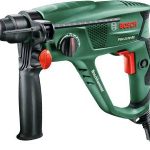 If you’re looking for a tool to perform heavy-duty tasks like drilling into concrete, chiseling hard material, and hammering, a rotary hammer drill is the right one. In this article, we will review the Bosch PBH 2100 RE Rotary Hammer.
Bosch… Read more.
If you’re looking for a tool to perform heavy-duty tasks like drilling into concrete, chiseling hard material, and hammering, a rotary hammer drill is the right one. In this article, we will review the Bosch PBH 2100 RE Rotary Hammer.
Bosch… Read more.
 If you’re looking for a tool to perform heavy-duty tasks like drilling into concrete, chiseling hard material, and hammering, a rotary hammer drill is the right one. In this article, we will review the Bosch PBH 2100 RE Rotary Hammer.
Bosch… Read more.
If you’re looking for a tool to perform heavy-duty tasks like drilling into concrete, chiseling hard material, and hammering, a rotary hammer drill is the right one. In this article, we will review the Bosch PBH 2100 RE Rotary Hammer.
Bosch… Read more.
TACKLIFE PID01A 2800RPM Hammer Drill Review
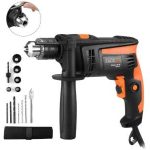 The hammer drill is a very impressive tool ever since it was invented. It can drill holes onto materials a person is working on. Many regard it as a handheld jackhammer and TACKLIFE is one of the leading companies in the world that make good… Read more.
The hammer drill is a very impressive tool ever since it was invented. It can drill holes onto materials a person is working on. Many regard it as a handheld jackhammer and TACKLIFE is one of the leading companies in the world that make good… Read more.
 The hammer drill is a very impressive tool ever since it was invented. It can drill holes onto materials a person is working on. Many regard it as a handheld jackhammer and TACKLIFE is one of the leading companies in the world that make good… Read more.
The hammer drill is a very impressive tool ever since it was invented. It can drill holes onto materials a person is working on. Many regard it as a handheld jackhammer and TACKLIFE is one of the leading companies in the world that make good… Read more.
JUEMEL M8828 20V Cordless Drill Driver Review
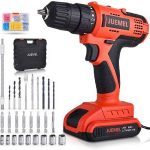 We all have DIY projects that need drilling from time to time however, you need to purchase the perfect product to get the job done. The JUEMEL M8828 is an amazing tool that is extremely strong and powerful. Before buying it, you need to know what… Read more.
We all have DIY projects that need drilling from time to time however, you need to purchase the perfect product to get the job done. The JUEMEL M8828 is an amazing tool that is extremely strong and powerful. Before buying it, you need to know what… Read more.
 We all have DIY projects that need drilling from time to time however, you need to purchase the perfect product to get the job done. The JUEMEL M8828 is an amazing tool that is extremely strong and powerful. Before buying it, you need to know what… Read more.
We all have DIY projects that need drilling from time to time however, you need to purchase the perfect product to get the job done. The JUEMEL M8828 is an amazing tool that is extremely strong and powerful. Before buying it, you need to know what… Read more.
Bosch UniversalImpact 18 Cordless Hammer Drill Review
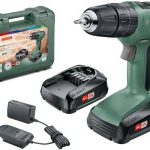 With the major improvement in the powertool industry, DIY task home/office projects, as well as other projects in the garden is now easier and less energy-demanding. In this article, we will review one such powertool- the Bosch UniversalImpact 18… Read more.
With the major improvement in the powertool industry, DIY task home/office projects, as well as other projects in the garden is now easier and less energy-demanding. In this article, we will review one such powertool- the Bosch UniversalImpact 18… Read more.
 With the major improvement in the powertool industry, DIY task home/office projects, as well as other projects in the garden is now easier and less energy-demanding. In this article, we will review one such powertool- the Bosch UniversalImpact 18… Read more.
With the major improvement in the powertool industry, DIY task home/office projects, as well as other projects in the garden is now easier and less energy-demanding. In this article, we will review one such powertool- the Bosch UniversalImpact 18… Read more.
Dewalt DCD776C1 18V Cordless Lithium LXT Combi Drill Review
 DeWalt is a leading producer and a reputable brand in the powertool industry. So, if you’re checking out our DeWalt DCD776C1 review because you’re considering on getting a good deal for a drill driver, you are going the right way.
Still, we… Read more.
DeWalt is a leading producer and a reputable brand in the powertool industry. So, if you’re checking out our DeWalt DCD776C1 review because you’re considering on getting a good deal for a drill driver, you are going the right way.
Still, we… Read more.
 DeWalt is a leading producer and a reputable brand in the powertool industry. So, if you’re checking out our DeWalt DCD776C1 review because you’re considering on getting a good deal for a drill driver, you are going the right way.
Still, we… Read more.
DeWalt is a leading producer and a reputable brand in the powertool industry. So, if you’re checking out our DeWalt DCD776C1 review because you’re considering on getting a good deal for a drill driver, you are going the right way.
Still, we… Read more.
MYLEK MY18BMC1 18V Cordless Drill Driver Review
 Cordless drill drivers provide an easy, fast, convenient, and efficient way of screw driving and drilling into materials. We have made evaluations on many top-quality drill drivers in the market today that will provide you a detailed assessment of… Read more.
Cordless drill drivers provide an easy, fast, convenient, and efficient way of screw driving and drilling into materials. We have made evaluations on many top-quality drill drivers in the market today that will provide you a detailed assessment of… Read more.
 Cordless drill drivers provide an easy, fast, convenient, and efficient way of screw driving and drilling into materials. We have made evaluations on many top-quality drill drivers in the market today that will provide you a detailed assessment of… Read more.
Cordless drill drivers provide an easy, fast, convenient, and efficient way of screw driving and drilling into materials. We have made evaluations on many top-quality drill drivers in the market today that will provide you a detailed assessment of… Read more.
Hi-Spec DT30327B-AUK 50 Piece 12V Drill Driver Review
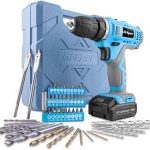 Power screw-driving and drilling tasks for your DIY tasks isn’t so much a hard exercise anymore- thanks to the rise of handheld drilling tools. These devices have gone through so many modifications own the years and now provide efficient driving… Read more.
Power screw-driving and drilling tasks for your DIY tasks isn’t so much a hard exercise anymore- thanks to the rise of handheld drilling tools. These devices have gone through so many modifications own the years and now provide efficient driving… Read more.
 Power screw-driving and drilling tasks for your DIY tasks isn’t so much a hard exercise anymore- thanks to the rise of handheld drilling tools. These devices have gone through so many modifications own the years and now provide efficient driving… Read more.
Power screw-driving and drilling tasks for your DIY tasks isn’t so much a hard exercise anymore- thanks to the rise of handheld drilling tools. These devices have gone through so many modifications own the years and now provide efficient driving… Read more.
Terratek FUT18V01-3 13Pc Cordless Drill Driver Review
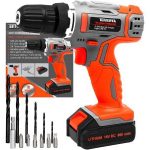 Finding a good drill can be challenging, especially if you want a tool that has good value for money. While that might not always be the case, the Terratek FUT18V01-3 defies the odds and offers you one amazing tool at a very affordable price point. … Read more.
Finding a good drill can be challenging, especially if you want a tool that has good value for money. While that might not always be the case, the Terratek FUT18V01-3 defies the odds and offers you one amazing tool at a very affordable price point. … Read more.
 Finding a good drill can be challenging, especially if you want a tool that has good value for money. While that might not always be the case, the Terratek FUT18V01-3 defies the odds and offers you one amazing tool at a very affordable price point. … Read more.
Finding a good drill can be challenging, especially if you want a tool that has good value for money. While that might not always be the case, the Terratek FUT18V01-3 defies the odds and offers you one amazing tool at a very affordable price point. … Read more.
Hi-Spec DT30319 Cordless Drill Driver Review
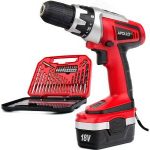 With a cordless drill combo, you can be sure of handling multiple projects remotely. Whether you are drilling into household softwoods, light ceramics, soft metals, or plastics, this power tool could be a good accessory for your workshop. The… Read more.
With a cordless drill combo, you can be sure of handling multiple projects remotely. Whether you are drilling into household softwoods, light ceramics, soft metals, or plastics, this power tool could be a good accessory for your workshop. The… Read more.
 With a cordless drill combo, you can be sure of handling multiple projects remotely. Whether you are drilling into household softwoods, light ceramics, soft metals, or plastics, this power tool could be a good accessory for your workshop. The… Read more.
With a cordless drill combo, you can be sure of handling multiple projects remotely. Whether you are drilling into household softwoods, light ceramics, soft metals, or plastics, this power tool could be a good accessory for your workshop. The… Read more.
Things to Consider When Buying a Drill - The Guide
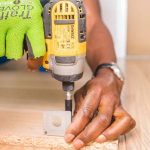 For most of us, buying a drill is a serious decision. Although the prices have fallen recently, making power tools more and more affordable, a good quality drill can still be somewhat expensive. Because of that it's important to do your research … Read more.
For most of us, buying a drill is a serious decision. Although the prices have fallen recently, making power tools more and more affordable, a good quality drill can still be somewhat expensive. Because of that it's important to do your research … Read more.
 For most of us, buying a drill is a serious decision. Although the prices have fallen recently, making power tools more and more affordable, a good quality drill can still be somewhat expensive. Because of that it's important to do your research … Read more.
For most of us, buying a drill is a serious decision. Although the prices have fallen recently, making power tools more and more affordable, a good quality drill can still be somewhat expensive. Because of that it's important to do your research … Read more.
Different Types of Drill Bits - Get To Know Them
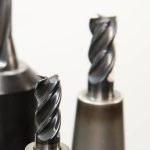 Using a drill seems like an easy thing. You want to make a hole in something and a drill is one of the fastest ways to do that. But beginner's don't often think about one thing - the type of bit that they need to use. There are different types of… Read more.
Using a drill seems like an easy thing. You want to make a hole in something and a drill is one of the fastest ways to do that. But beginner's don't often think about one thing - the type of bit that they need to use. There are different types of… Read more.
 Using a drill seems like an easy thing. You want to make a hole in something and a drill is one of the fastest ways to do that. But beginner's don't often think about one thing - the type of bit that they need to use. There are different types of… Read more.
Using a drill seems like an easy thing. You want to make a hole in something and a drill is one of the fastest ways to do that. But beginner's don't often think about one thing - the type of bit that they need to use. There are different types of… Read more.
Corded Versus Cordless Drill - Which One?
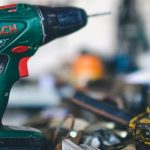 There are two types of drills, the cordless drill, and a
corded drill. The cordless drill is the most commonly used by the homeowners,
for their home improvements tasks. For the people who are buying the drill for
the first time, they will go for… Read more.
There are two types of drills, the cordless drill, and a
corded drill. The cordless drill is the most commonly used by the homeowners,
for their home improvements tasks. For the people who are buying the drill for
the first time, they will go for… Read more.
 There are two types of drills, the cordless drill, and a
corded drill. The cordless drill is the most commonly used by the homeowners,
for their home improvements tasks. For the people who are buying the drill for
the first time, they will go for… Read more.
There are two types of drills, the cordless drill, and a
corded drill. The cordless drill is the most commonly used by the homeowners,
for their home improvements tasks. For the people who are buying the drill for
the first time, they will go for… Read more.
How To Choose A Cordless Drill Kit? Quick Guide
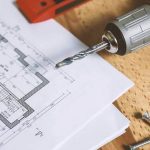 Regardless of whether or not you are a construction
professional looking to outfit yourself with nothing but the best power tools
to get the job done right the first time around or a homeowner/DIYer looking to
start putting things together around… Read more.
Regardless of whether or not you are a construction
professional looking to outfit yourself with nothing but the best power tools
to get the job done right the first time around or a homeowner/DIYer looking to
start putting things together around… Read more.
 Regardless of whether or not you are a construction
professional looking to outfit yourself with nothing but the best power tools
to get the job done right the first time around or a homeowner/DIYer looking to
start putting things together around… Read more.
Regardless of whether or not you are a construction
professional looking to outfit yourself with nothing but the best power tools
to get the job done right the first time around or a homeowner/DIYer looking to
start putting things together around… Read more.
Makita HR2630 SDS Plus Rotary Hammer Drill Review
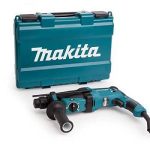 There are hammer drills that can get jobs done in high fashion, but not all can be as multipurpose as the Makita HR2630 rotary hammer drill, which we will be looking at today. So, if you've never known or heard about this sturdy machine, now is the … Read more.
There are hammer drills that can get jobs done in high fashion, but not all can be as multipurpose as the Makita HR2630 rotary hammer drill, which we will be looking at today. So, if you've never known or heard about this sturdy machine, now is the … Read more.
 There are hammer drills that can get jobs done in high fashion, but not all can be as multipurpose as the Makita HR2630 rotary hammer drill, which we will be looking at today. So, if you've never known or heard about this sturdy machine, now is the … Read more.
There are hammer drills that can get jobs done in high fashion, but not all can be as multipurpose as the Makita HR2630 rotary hammer drill, which we will be looking at today. So, if you've never known or heard about this sturdy machine, now is the … Read more.
Bosch GSR 12V-15 FC Cordless Drill Driver Set Review
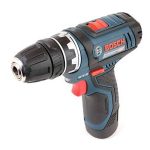 A cordless drill is one of the power tools that are commonly found in construction sites, garages, and repair shops. It is an essential tools which you should have in your arsenal if you are a dedicated DIY, professional contractor, or woodworker.… Read more.
A cordless drill is one of the power tools that are commonly found in construction sites, garages, and repair shops. It is an essential tools which you should have in your arsenal if you are a dedicated DIY, professional contractor, or woodworker.… Read more.
 A cordless drill is one of the power tools that are commonly found in construction sites, garages, and repair shops. It is an essential tools which you should have in your arsenal if you are a dedicated DIY, professional contractor, or woodworker.… Read more.
A cordless drill is one of the power tools that are commonly found in construction sites, garages, and repair shops. It is an essential tools which you should have in your arsenal if you are a dedicated DIY, professional contractor, or woodworker.… Read more.
Bosch GBH 2-26 Corded 230V Rotary Hammer Drill Review
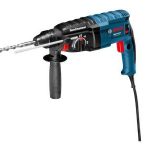 Since 1886, the Germany based company, Bosch has been in the power tool industry. The company has a reputation for its pioneering and innovative technology alongside other top brands like DeWalt and Makita. In particular, the Bosch GBH 2-26 is a… Read more.
Since 1886, the Germany based company, Bosch has been in the power tool industry. The company has a reputation for its pioneering and innovative technology alongside other top brands like DeWalt and Makita. In particular, the Bosch GBH 2-26 is a… Read more.
 Since 1886, the Germany based company, Bosch has been in the power tool industry. The company has a reputation for its pioneering and innovative technology alongside other top brands like DeWalt and Makita. In particular, the Bosch GBH 2-26 is a… Read more.
Since 1886, the Germany based company, Bosch has been in the power tool industry. The company has a reputation for its pioneering and innovative technology alongside other top brands like DeWalt and Makita. In particular, the Bosch GBH 2-26 is a… Read more.
Bosch GBH 2-24 D Corded 240 V Rotary Hammer Drill Review
 The Bosch GBH 2-24 D is one of the most robust and reliable tools you can spend your money on. It has a very fast drilling rate and performs better than most tools on the market thanks to the 790-watt motor as well as the 2.7 joules of impact… Read more.
The Bosch GBH 2-24 D is one of the most robust and reliable tools you can spend your money on. It has a very fast drilling rate and performs better than most tools on the market thanks to the 790-watt motor as well as the 2.7 joules of impact… Read more.
 The Bosch GBH 2-24 D is one of the most robust and reliable tools you can spend your money on. It has a very fast drilling rate and performs better than most tools on the market thanks to the 790-watt motor as well as the 2.7 joules of impact… Read more.
The Bosch GBH 2-24 D is one of the most robust and reliable tools you can spend your money on. It has a very fast drilling rate and performs better than most tools on the market thanks to the 790-watt motor as well as the 2.7 joules of impact… Read more.
Black & Decker BCD700S1K-GB 18V Cordless 2-Gear Combi Drill Review
 Any DIY enthusiast that is looking for a tool that gives you enough power to carry out jobs like drilling masonry, metal or wood will be spoiled for choice because they are so many drills on the market. However, one tool that needs to be on their… Read more.
Any DIY enthusiast that is looking for a tool that gives you enough power to carry out jobs like drilling masonry, metal or wood will be spoiled for choice because they are so many drills on the market. However, one tool that needs to be on their… Read more.
 Any DIY enthusiast that is looking for a tool that gives you enough power to carry out jobs like drilling masonry, metal or wood will be spoiled for choice because they are so many drills on the market. However, one tool that needs to be on their… Read more.
Any DIY enthusiast that is looking for a tool that gives you enough power to carry out jobs like drilling masonry, metal or wood will be spoiled for choice because they are so many drills on the market. However, one tool that needs to be on their… Read more.
Makita DTD154Z Brushless 3-Speed Impact Driver Review
 The impact drill is one of the few power tools that we can’t seem to get enough of. These tools provide increased driving power to nuts, bolts, and drive screws. If you are a professional looking for an impact driver that is ideal for use both… Read more.
The impact drill is one of the few power tools that we can’t seem to get enough of. These tools provide increased driving power to nuts, bolts, and drive screws. If you are a professional looking for an impact driver that is ideal for use both… Read more.
 The impact drill is one of the few power tools that we can’t seem to get enough of. These tools provide increased driving power to nuts, bolts, and drive screws. If you are a professional looking for an impact driver that is ideal for use both… Read more.
The impact drill is one of the few power tools that we can’t seem to get enough of. These tools provide increased driving power to nuts, bolts, and drive screws. If you are a professional looking for an impact driver that is ideal for use both… Read more.
Bosch EasyImpact 550 Hammer Drill Review
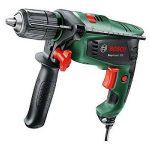 Maybe the reason why you haven't found so much passion in drilling activities is that you are yet to purchase perfect drillers such as Bosch EasyImpact 550 hammer driller. That's why today, we are going to take a look at this fantastic quarter-inch … Read more.
Maybe the reason why you haven't found so much passion in drilling activities is that you are yet to purchase perfect drillers such as Bosch EasyImpact 550 hammer driller. That's why today, we are going to take a look at this fantastic quarter-inch … Read more.
 Maybe the reason why you haven't found so much passion in drilling activities is that you are yet to purchase perfect drillers such as Bosch EasyImpact 550 hammer driller. That's why today, we are going to take a look at this fantastic quarter-inch … Read more.
Maybe the reason why you haven't found so much passion in drilling activities is that you are yet to purchase perfect drillers such as Bosch EasyImpact 550 hammer driller. That's why today, we are going to take a look at this fantastic quarter-inch … Read more.
Bosch GSB 120-LI Professional 12V Review
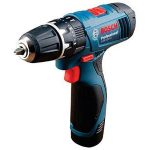 There are a or of drill/drivers out there that claim to get jobs done flawlessly. However, out of the many that do make these promises, only a few of them do live up to expectations, one of which is Bosch GSB 120-LI Professional. So today, we are… Read more.
There are a or of drill/drivers out there that claim to get jobs done flawlessly. However, out of the many that do make these promises, only a few of them do live up to expectations, one of which is Bosch GSB 120-LI Professional. So today, we are… Read more.
 There are a or of drill/drivers out there that claim to get jobs done flawlessly. However, out of the many that do make these promises, only a few of them do live up to expectations, one of which is Bosch GSB 120-LI Professional. So today, we are… Read more.
There are a or of drill/drivers out there that claim to get jobs done flawlessly. However, out of the many that do make these promises, only a few of them do live up to expectations, one of which is Bosch GSB 120-LI Professional. So today, we are… Read more.
Ryobi R18IDBL-0 18V ONE+ Cordless Brushless Impact Driver Review
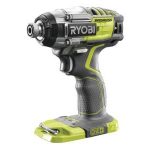 Ryobi is a Japanese manufacturer of power equipment with headquarters in Fuchu, Hiroshima. The company aims to make pro-featured power tools and other products available at an affordable price. Ryobi R18IDBL-0 18V is an excellent product from the… Read more.
Ryobi is a Japanese manufacturer of power equipment with headquarters in Fuchu, Hiroshima. The company aims to make pro-featured power tools and other products available at an affordable price. Ryobi R18IDBL-0 18V is an excellent product from the… Read more.
 Ryobi is a Japanese manufacturer of power equipment with headquarters in Fuchu, Hiroshima. The company aims to make pro-featured power tools and other products available at an affordable price. Ryobi R18IDBL-0 18V is an excellent product from the… Read more.
Ryobi is a Japanese manufacturer of power equipment with headquarters in Fuchu, Hiroshima. The company aims to make pro-featured power tools and other products available at an affordable price. Ryobi R18IDBL-0 18V is an excellent product from the… Read more.
Bosch PSB 1800 LI-2 Cordless Combi Drill Review
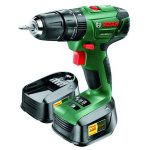 The powerful cordless Bosch PSB 1800 LI-2, which has a battery of 18 V provides multiple speed settings. It has multiple useful features that make it ideal for a wide range of uses. The Bosch has adjustable torque settings and high endurance. This… Read more.
The powerful cordless Bosch PSB 1800 LI-2, which has a battery of 18 V provides multiple speed settings. It has multiple useful features that make it ideal for a wide range of uses. The Bosch has adjustable torque settings and high endurance. This… Read more.
 The powerful cordless Bosch PSB 1800 LI-2, which has a battery of 18 V provides multiple speed settings. It has multiple useful features that make it ideal for a wide range of uses. The Bosch has adjustable torque settings and high endurance. This… Read more.
The powerful cordless Bosch PSB 1800 LI-2, which has a battery of 18 V provides multiple speed settings. It has multiple useful features that make it ideal for a wide range of uses. The Bosch has adjustable torque settings and high endurance. This… Read more.
